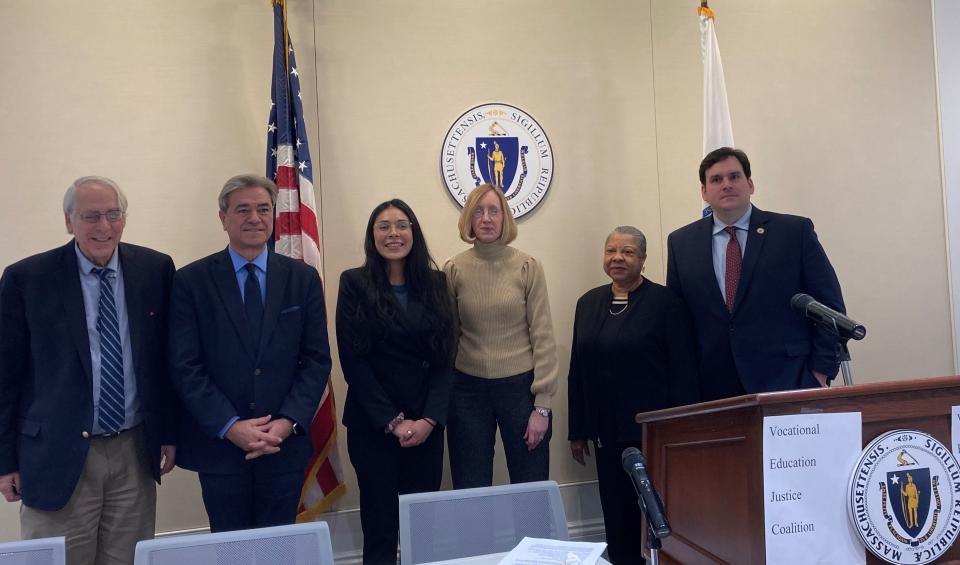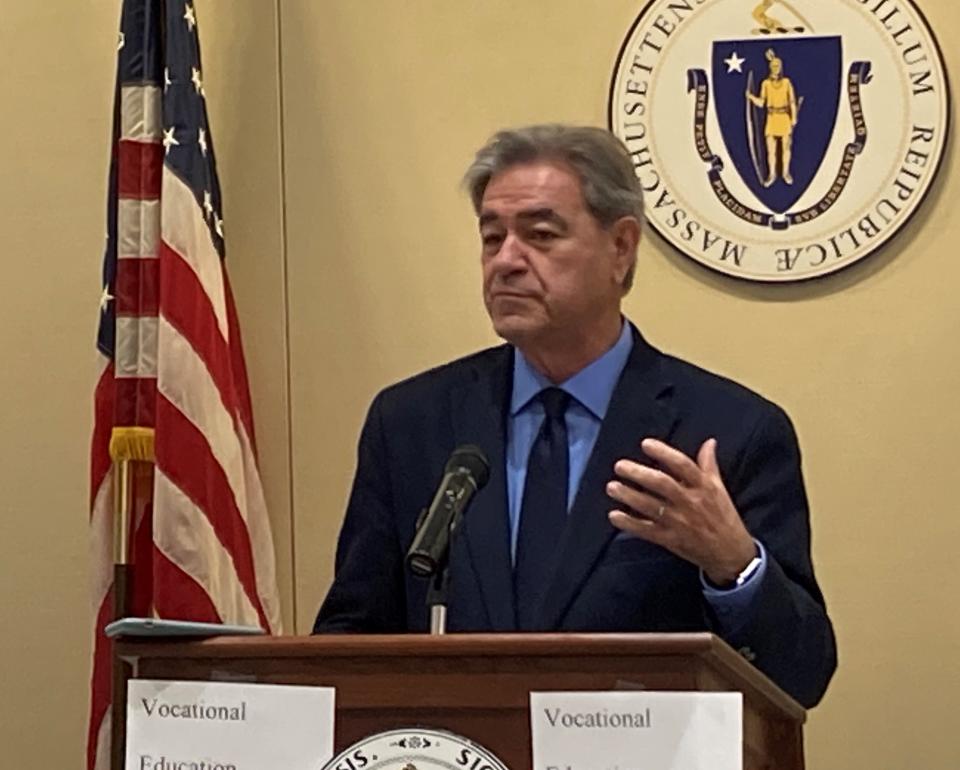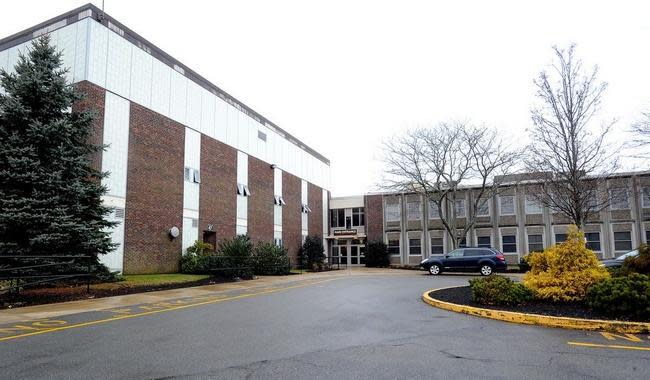Lawsuit against DESE alleges civil rights violations in voc tech admissions
BOSTON — A coalition of Massachusetts community groups, unions and civil rights organizations filed a federal civil rights complaint against the state’s Department of Elementary and Secondary Education on Thursday, alleging the state allows vocational technical high schools to use admissions policies that discriminate against protected classes of applicants.
“Our position is not radical. Public schools should no longer be able to use private schools’ admissions criteria to systemically discriminate and keep the most vulnerable eighth graders in our state out of our trade schools,” said state Sen. John Cronin, a Democrat who represents Fitchburg. “So, let’s stop denying kids from disadvantaged backgrounds a pathway to the middle class.”
Cronin was speaking at a press conference on Thursday morning organized by the Vocational Education Justice Coalition, the group behind the lawsuit.
Lawyers from Lawyers for Civil Rights and the Center of Law and Education have filed a federal civil rights complaint to the United States Department of Education's Office of Civil Rights on behalf of four students from Chelsea and Gardner. The complaint alleges that vocational technical high schools discriminate against students of color, disabled students, students who are economically disadvantaged and those who are English Language Learners by looking at criteria like grades, attendance and disciplinary records for students applying for admission.
The Gardner connection
There are two Gardner students included in the lawsuit. Both are listed under pseudonyms as they are minors. The first student, Juan Doe, a Latinx student, sought information about attending Monty Tech while he was an eighth grader during 2021-22. Despite a B-grade point average, no disciplinary or attendance issues and a positive interview experience, he was denied admission.
Similarly, Aaron Doe, a student with disabilities and an Individualized Education Program (IEP) became interested in Monty Tech after working in his uncle's construction business during the summer. During the school year 2019-2020, he applied to the school specifically because he was aware that he thrived in a school environment with hands-on instruction, but was also denied admission.
Like many other vocational high schools, Monty Tech uses a point system for admissions, with students with more points admitted before students with fewer points.

The complaint asks the U.S. Department of Education’s Office of Civil Rights to suspend federal funding to DESE until the state department instructs vocational schools to stop using what the coalition calls discriminatory admissions criteria and implement a fairer admissions process.
The coalition is also asking Gov. Maura Healey to ask the state’s Board of Education to change the admissions policy from the ranking of students to a lottery. Cronin and state Rep. Tony Cabral, a Democrat from New Bedford, have filed legislation that would require vocational schools to use a lottery for admissions.
A representative for DESE provided a statement in response to news of the complaint: "The Department of Elementary and Secondary Education (DESE) is reviewing the complaint that the Vocational Education Justice Coalition filed with the Office for Civil Rights and cannot comment on the allegations at this time."
A call to unify admission standards
Cabral, an immigrant from Portugal, said vocational schools should be held to the same standards as other public schools because of the important opportunities they can provide.
“At the age of 14, I couldn’t speak a word of English. And why am I here today? Because of public schools and the opportunities I had at public schools,” he said during Thursday’s press conference.

Previously, the state instructed all vocational high schools to look at applicants’ grades, attendance, discipline records and recommendations from school counselors. In June of 2021, the state issued a new directive that says schools must now make their own admissions policies. These policies may not consider a student's record of excused absences from school, or minor behavior or disciplinary infractions.
Schools must also create a “plan that includes deliberate, specific strategies to promote equal educational opportunities and attract, enroll, and retain a student population that, when compared to students in similar grades in sending districts, has a comparable academic and demographic profile.”
Only one of 28 vocational schools uses a lottery
But advocates say this change has not gone far enough and are pushing to require vocational schools to use a lottery system that would not rank some students over others. Out of 28 vocational high schools in Massachusetts, only one, Assabet Valley Regional Technical High School in Marlborough, has switched to a full lottery system for admissions offers. The other 27 all use a points-based ranking system when considering applicants, which includes looking at students’ disciplinary records.

The coalition analyzed data from DESE on admissions to the state's vocational high schools for the 2022-2023 school year. It indicates that across the 27 vocational schools statewide that have not switched to a lottery system, 55% of applicants of color were offered admission versus 69% of white students, 54% of economically disadvantaged of applying students were admitted versus 72% of non-economically advantaged students, 54% of applicants who are special education students were offered admissions verses 65% of general education students, and 44% of applicants who are English Language Learners were admitted versus 64% of students who are not English Language Learners.
“Why is it that our futures are decided on middle school grades, discipline records, attendance and recommendations made by people who may not even know us instead of judging us purely on our show of potential for hard work and determination?” said Josue Castellon, a junior at Chelsea High School who applied to vocational school but was waitlisted.
Advocates for the lottery system said relying on grades and factors like disciplinary records means students who struggle in a traditional academic setting but who could potentially thrive in a vocational school miss out on that opportunity. The admissions policies also mean students from disadvantaged groups apply to vocational schools at lower rates than their peers, members of the coalition said, because they assume they will not be admitted because of factors like their grades or attendance record.
Renee Ledbetter, president of United Interfaith Action and president of the New Bedford branch of the NAACP, spoke during the press conference about a student she worked with in New Bedford who was admitted to Greater New Bedford Regional Vocational Technical High School after they moved to a system that is still mostly ranked but allows for 65 students to be admitted through a lottery. This student struggled in school and at home and had a lot of absences, but found a renewed enthusiasm for school after being admitted to vocational school.
“He began to change even before he entered New Bedford Voke this past year. He finally felt worthy. He rose to the opportunity, and he now has As and Bs in all his classes, has a great disciplinary record and is doing well at home,” she said.
SouthCoast vocational schools have disparity in admissions
Both Diman Regional Technical High School in Fall River and New Bedford Voke have lower rates of students who are people of color, disabled, low-income and English Language Learners than the traditional public school districts in their home cities. Both schools admit students from relatively wealthier towns with a higher white population along with students from their home cities, which could account for some disparities.
Voke in particular has seen a sharp disparity in admissions from some disadvantaged groups, especially among English Language Learners. Following the 2021 change from DESE, the school switched to a partial lottery system for admissions.
New Bedford Mayor Jon Mitchell has been outspoken about the need for vocational schools to change their admissions policies. He called the school’s new policy a lottery “only in name” that has not increased the school’s admission of English Language Learners and said it is flawed in particular because it excludes students who are chronically absent.
This year, despite the move to admitting some students through a lottery, Voke admitted 35% of English Language Learner applicants compared to 66% of students who were not ELL students, according to state data. This means that 4.2% of all students who received offers were ELL students, 29 students in total. In New Bedford Public Schools, state data shows 26.1% of students are English Language Learners.
Voke also admitted 49% of special education applicants verses 66% of general education applicants. Special education students made up 11.6% of accepted applicants, while making up 22.1% of students in New Bedford Public Schools.
“Nobody should confuse any of this with my respect for vocational education and in particular for Greater New Bedford Regional Vocational Technical High School. Our voke school has performed very well and it’s an institution I’ve long supported,” Mitchell said. “The problem is they have an admissions policy that unfairly keeps some kids out.”
Since the new instructions from DESE were released, Diman has switched to looking at an applicant’s grades and attendance and asking for a letter of recommendation from a school counselor. They now only consider a student’s disciplinary record if a student was charged with a felony or received a suspension of longer than 10 days, according to principal Andrew Rebello. The school previously asked for three letters of recommendation and also considered minor disciplinary infractions.
Brian Bentley, Diman’s interim superintendent, said the school has recently ramped up its ELL services and hired more special education teachers.
Still, Diman has seen a wide gap in recent admission rates among some disadvantaged groups, according to the DESE data. This year, the school admitted 18% of ELL applicants verses 40% of non-ELL applicants, and 31% of economically disadvantaged students compared to 51% of applicants who were not economically disadvantaged. Of students who applied this year, 4.6% of those admitted, 21 students, were ELL students. In Fall River Public Schools, 21.3% of students are English Language Learners.
Some gaps were narrower and showed an increase in the rates at which members of a disadvantaged group was admitted; 34% of special education applicants were admitted this year verses 39% of general education applicants. This means 15.2% of students who were accepted were special education students. Currently, 9.9% of students at Diman are in special education.
Bentley said he would want to wait until more data is available before considering moving to a lottery system, and that he’s happy with the progress Diman is making toward making the school reflect the demographics of its sending communities. DESE approved their new admissions policies and has not instructed them to change them, he pointed out.
“Right now, we’re comfortable, unless the department rules otherwise,” he said.
Gardner News Editor Sandy Meindersma (smeindersma@gannett.com) contributed to this report.
This article originally appeared on The Herald News: Lawsuit alleges civil rights violations in voc tech admissions

